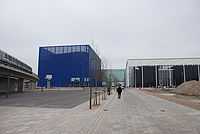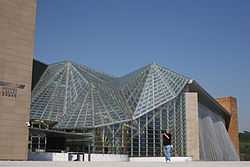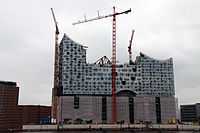Vineyard style (architecture)
The vineyard style is a term used for the design of a concert hall where the seating surrounds the stage, rising up in serried rows in the manner of the sloping terraces of a vineyard. It may be contrasted with the shoebox style, which has a rectangular auditorium and a stage at one end (as at the Musikverein). Other possibilities are the fan-shaped (as at the Barbican) and the arena (as at the Royal Albert Hall). The design might be considered a musical theatre in the round.[1][2][3]
History
When faced with designing a new home for the Berlin Philharmonic Orchestra to replace Die alte Philharmonie, destroyed by bombing in 1944, architect Hans Scharoun observed that "people always gather in circles when listening to music informally".[3] His design won the ensuing competition, with Herbert von Karajan writing to the judges "of all the designs submitted, one seems to stand out above the others... founded on the principle that the performers should be in the middle... the deployment of the walls certainly makes good sense acoustically, but the most impressive of all is the complete concentration of the listener on the musical event".[4]
Following the example of the Philharmonie, the first example in the New World was the Sala Nezahualcoyotl of 1976 in Mexico City.[5] The style is now to found globally.[2] For the Philharmonie de Paris, currently under construction, the vineyard concept is to be extended with balconies rather than banked terraces.[6]
Acoustics
Echoes occur when there is an audible gap between the direct sound and its reflection.[7] The walls surrounding the stage on which the seats are banked help provide the early reflections of sound from the side that are generally considered favourable.[8][3][2] Installation of acoustic reflectors is another way of solving the problem.[9]
Notable examples
| Concert Hall | Exterior | Opened | Location | Architect | Acoustics | Capacity | Auditorium |
|---|---|---|---|---|---|---|---|
| Berliner Philharmonie[4] |  | 1963 | Berlin, Germany | Hans Scharoun | Lothar Cremer | 2440 |  |
| Suntory Hall[10][11] |  | 1986 | Tokyo, Japan | Yasui Architects | Nagata Acoustics | 2006 |  |
| Sapporo Concert Hall[12][2] |  | 1997 | Sapporo, Japan | Hokkaido Engineering Consultant Company | Nagata Acoustics | 2008 | |
| Walt Disney Concert Hall[13][2] |  | 2003 | Los Angeles, USA | Frank O. Gehry | Nagata Acoustics | 2265 |  |
| Koncerthuset[14][15][16] |  | 2006 | Copenhagen, Denmark | Jean Nouvel | Nagata Acoustics | 1800 |  |
| Shenzhen Concert Hall[17][18] |  | 2007 | Shenzhen, China | Arata Isozaki | Nagata Acoustics | 1800 | |
| Helsinki Music Centre[19][20][21] |  | 2010 | Helsinki, Finland | Architectural office Laiho-Pulkkinen-Raunio | Nagata Acoustics | 1800 |  |
| Elbphilharmonie[22][23] |  | under construction | Hamburg, Germany | Herzog & de Meuron | Nagata Acoustics | 2150 | |
See also
References
- ↑ Beranek, Leo L. (1992). "Concert hall acoustics—1992". Journal of the Acoustical Society of America (Acoustical Society of America) 92 (1): 1–39. Bibcode:1992ASAJ...92....1B. doi:10.1121/1.404283.
- ↑ 2.0 2.1 2.2 2.3 2.4 Adams, Richard (2 July 2011). "Aspen Ideas Festival: How the vineyard style trumped the shoebox". The Guardian. Retrieved 5 March 2012.
- ↑ 3.0 3.1 3.2 "Concert Hall Acoustics: Art and Science". University of Salford. Retrieved 5 March 2012.
- ↑ 4.0 4.1 Osborne, Richard (1998). Herbert von Karajan: A Life in Music. Chatto & Windus. pp. 475f. ISBN 1-55553-425-2.
- ↑ Jaffe, Christopher; Rivera, Carlos (2002). "The first vineyard concert hall in North America". Journal of the Acoustical Society of America (Acoustical Society of America) 112 (5): 2255–2256. Bibcode:2002ASAJ..112.2255J.
- ↑ "Making acoustic choices for the future symphony hall". Philharmonie de Paris. Retrieved 5 March 2012.
- ↑ Sadie, Stanley, ed. (2001). The New Grove Dictionary of Music and Musicians 1. pp. 70–97. ISBN 978-0-19-517067-2.
- ↑ Cremer, Lothar (1987). "Early lateral reflections in modern concert halls". Journal of the Acoustical Society of America (Acoustical Society of America) 81 (1): 52. Bibcode:1987ASAJ...81...52F. doi:10.1121/1.2024280.
- ↑ Wei-hwa Chiang (et al.) (2010). "Stage acoustics for vineyard concert hall". Proceedings of the International Symposium on Room Acoustics, ISRA 2010.
- ↑ "Suntory Hall - Facilities". Suntory Hall. Retrieved 5 March 2012.
- ↑ "Suntory Hall". Nagata Acoustics. Retrieved 5 March 2012.
- ↑ "Sapporo Concert Hall". Nagata Acoustics. Retrieved 5 March 2012.
- ↑ "Walt Disney Concert Hall". Nagata Acoustics. Retrieved 5 March 2012.
- ↑ "Danish Radio Concert Hall, Copenhagen". Nagata Acoustics. Retrieved 5 March 2012.
- ↑ Hewett, Ivan (4 February 2009). "The new Copenhagen concert hall: It looks seductive and sounds terrific". The Daily Telegraph. Retrieved 4 March 2012.
- ↑ "Koncerthuset - Presentation". Koncerthuset. Retrieved 5 March 2012.
- ↑ "International Activities - Shenzhen Concert Hall's Symphony Hall, Shenzhen". Nagata Acoustics. Retrieved 5 March 2012.
- ↑ Oguchi Keiji; Toyota Yasuhisa (2008). "Acoustical design of Shenzhen Concert Hall, Shenzhen China". Journal of the Acoustical Society of America (Acoustical Society of America) 123 (5): 2973. Bibcode:2008ASAJ..123.2973T. doi:10.1121/1.2932462.
- ↑ "International Activities - Helsinki Music Centre". Nagata Acoustics. Retrieved 5 March 2012.
- ↑ "Helsinki's new Music Centre garners rave reviews". Ministry for Foreign Affairs (Finland). Retrieved 5 March 2012.
- ↑ "Helsinki Music Centre Concert Halls and Other Spaces". Helsinki Music Centre. Retrieved 5 March 2012.
- ↑ "International Activities - Elbephilharmonie, Hamburg". Nagata Acoustics. Retrieved 5 March 2012.
- ↑ "Elbphilharmonie - The Project". Elbphilharmonie. Retrieved 5 March 2012.